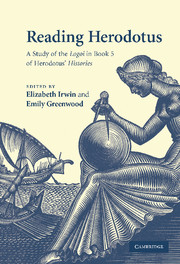Book contents
- Frontmatter
- Contents
- Acknowledgements
- List of contributors
- List of abbreviations
- Introduction: reading Herodotus, reading Book 5
- Chapter 1 ‘What's in a name?’ and exploring the comparable: onomastics, ethnography, and kratos in Thrace, (5.1–2 and 3–10)
- Chapter 2 The Paeonians (5.11–16)
- Chapter 3 Narrating ambiguity: murder and Macedonian allegiance (5.17–22)
- Chapter 4 Bridging the narrative (5.23–7)
- Chapter 5 The trouble with the Ionians: Herodotus and the beginning of the Ionian Revolt (5.28–38.1)
- Chapter 6 The Dorieus episode and the Ionian Revolt (5.42–8)
- Chapter 7 Aristagoras (5.49–55, 97)
- Chapter 8 Structure and significance (5.55–69)
- Chapter 9 Athens and Aegina (5.82–9)
- Chapter 10 ‘Saving’ Greece from the ‘ignominy’ of tyranny? The ‘famous’ and ‘wonderful’ speech of Socles (5.92)
- Chapter 11 Cyprus and Onesilus: an interlude of freedom (5.104, 108–16)
- Chapter 12 ‘The Fourth Dorian Invasion’ and ‘The Ionian Revolt’ (5.76–126)
- Bibliography
- Index locorum
- General index
Chapter 3 - Narrating ambiguity: murder and Macedonian allegiance (5.17–22)
Published online by Cambridge University Press: 22 September 2009
- Frontmatter
- Contents
- Acknowledgements
- List of contributors
- List of abbreviations
- Introduction: reading Herodotus, reading Book 5
- Chapter 1 ‘What's in a name?’ and exploring the comparable: onomastics, ethnography, and kratos in Thrace, (5.1–2 and 3–10)
- Chapter 2 The Paeonians (5.11–16)
- Chapter 3 Narrating ambiguity: murder and Macedonian allegiance (5.17–22)
- Chapter 4 Bridging the narrative (5.23–7)
- Chapter 5 The trouble with the Ionians: Herodotus and the beginning of the Ionian Revolt (5.28–38.1)
- Chapter 6 The Dorieus episode and the Ionian Revolt (5.42–8)
- Chapter 7 Aristagoras (5.49–55, 97)
- Chapter 8 Structure and significance (5.55–69)
- Chapter 9 Athens and Aegina (5.82–9)
- Chapter 10 ‘Saving’ Greece from the ‘ignominy’ of tyranny? The ‘famous’ and ‘wonderful’ speech of Socles (5.92)
- Chapter 11 Cyprus and Onesilus: an interlude of freedom (5.104, 108–16)
- Chapter 12 ‘The Fourth Dorian Invasion’ and ‘The Ionian Revolt’ (5.76–126)
- Bibliography
- Index locorum
- General index
Summary
In Herodotus 5.17–21, Amyntas receives the Persian ambassadors sent to demand submission to Darius, accepts their offer, and gives a banquet to welcome the Persians. The youthful Alexander, outraged at the Persians' treatment of Macedonian women during the after-dinner drinking, assassinates the ambassadors by replacing the endangered women with young men carrying knives, who kill the Persians; Alexander then manages to keep the affair secret, by handing over his sister Gygaea to Bubares, the leader of the Persian search party and son of Megabazus. An account is then given in chapter 22 of Alexander's demonstration of Greekness at Olympia, and his victory in the stadion there.
Herodotus' treatment of Alexander and his father Amyntas has an important place in Book 5. Chapters 17–21 form a bridge between Darius' failed invasion of Scythia in Book 4 and the Ionian Revolt and subsequent Persian invasion of Greece in Books 5 and following; they follow immediately on from Megabazus' deportation of the Paeonians of Thrace to Persia on Darius' instruction in the first sixteen chapters. The Macedonian ruling family is thus introduced in a way that focuses on relations with Persia. Alexander's political and strategic actions then tie in with Herodotus' concern with medism, and the question of the allegiance by Greek poleis to the cause against Persia in Books 8 and 9.
Herodotus' engagement with Alexander here has been explored in some important work.
- Type
- Chapter
- Information
- Reading HerodotusA Study of the Logoi in Book 5 of Herodotus' Histories, pp. 98 - 127Publisher: Cambridge University PressPrint publication year: 2007
- 27
- Cited by

